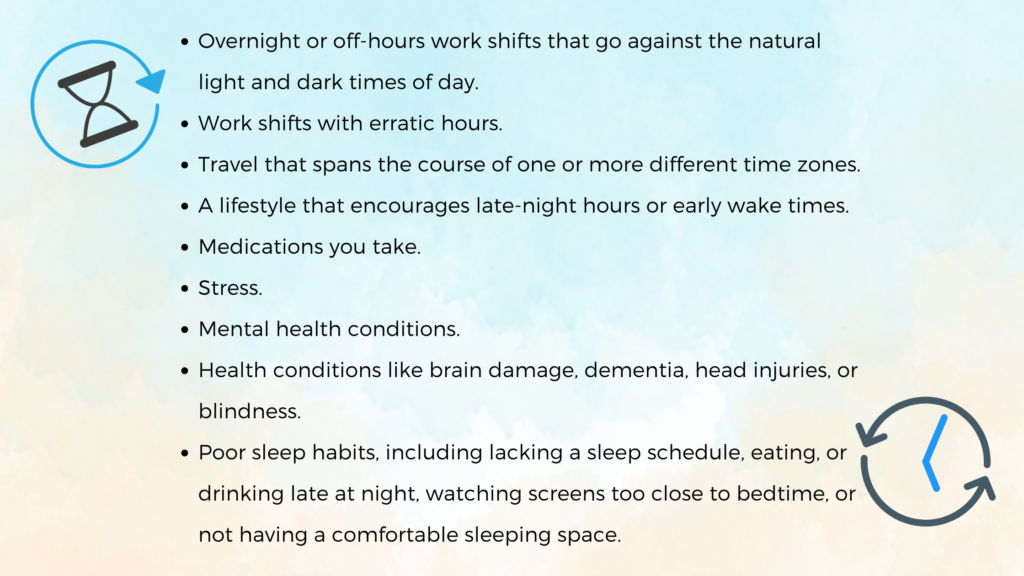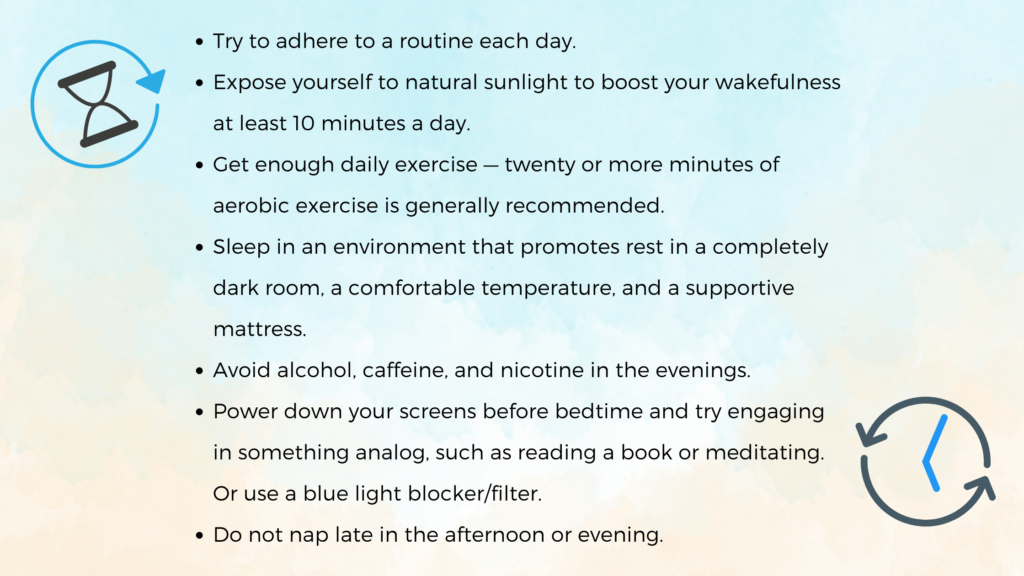Circadian rhythms are 24-hour cycles that are part of the body’s biological internal clock, running in the background to carry out essential functions and processes. The term circadian comes from the Latin phrase “circa diem,” which means “around a day.” One of the most important and well-known circadian rhythms is the sleep-wake cycle.
Different systems of the body follow circadian rhythms that are synchronized with a master clock in the brain. This master clock is directly influenced by environmental cues, especially light, which is why circadian rhythms are tied to the cycle of day and night.
When properly aligned, a circadian rhythm can promote consistent and restorative sleep. But when this circadian rhythm is thrown off, it can create significant sleeping and health problems.
How it works

The circadian rhythms throughout the body are connected to a master clock, sometimes referred to as the body’s pacemaker, located in the brain. Specifically, it is found in the suprachiasmatic nucleus (SCN), which is in a part of the brain called the hypothalamus.
The SCN is highly sensitive to light, which serves as an critical external cue that influences the signals sent by the SCN to coordinate internal clocks in the body. For this reason, circadian rhythms are closely connected to day and night. While other cues, like exercise, social activity, and temperature, can affect the master clock, light is the most powerful influence on circadian rhythms.
What else does it affect besides sleep?
While the sleep-wake cycle is one of the most prominent circadian rhythms, these 24-hour internal clocks play a vital role in virtually all systems of the body.
Circadian rhythms influence mental health as well, including the risk of psychiatric illnesses like depression and bipolar disorder as well as the potential for neurodegenerative diseases like dementia.
Hormones like melatonin and cortisol also increase or decrease as part of your circadian rhythm. Melatonin is the hormone that makes you sleepy, and your body releases more of it at night and suppresses it during the day. While cortisol can make you more alert, and your body produces more of it in the morning.
Body temperature and metabolism are also part of your circadian rhythm. Your temperature drops when you sleep and rises during awake hours. Additionally, your metabolism works at different rates throughout the day, and every cell in our gut has it’s own circadian clock – mind blowing, isn’t it?
How it gets out of sync
Not everything is within our control, but much is. So it’s important to practice consistency in all the ways we can in order to have the best outcomes. Even then, we face life’s variables and we make a choice to do the best with what we are able. Some ways our circadian rhythms get out of sync:

How to reset your clock
Here are some tips to get those circadian rhythms back to optimal function:

To know more about how you can get complete restorative sleep on a regular basis – click on this link and read my Sleep Better Series.
Health effects
When circadian rhythms are thrown off, it means that the body’s systems don’t function optimally.
Maintaining your circadian rhythms is vital to your health. If you experience disruption to your circadian rhythms and struggle to get the proper amount of sleep, you may experience both short-term and long-term consequences to your health.
Disruption to your circadian rhythms can cause health conditions in several parts of the body in the long term. This can include your:
- organs
- cardiovascular system
- metabolism
- gastrointestinal system
- skin
You may be more susceptible to diabetes, obesity, and mental health conditions as well.
Short-term disruptions to your circadian rhythm may result in problems with memory or lack of energy. It may also take longer to heal an injury if you don’t get enough sleep. Interesting, right?
Your circadian rhythms are your body’s natural ways of keeping to its 24-hour body clock, helping your body operate on a healthy sleep-wake schedule. Living a healthy, active lifestyle that promotes proper rest will help you maintain this important component of your body.
I recently had an opportunity to put into practice what I’ve been learning about Circadian Rhythms. I traveled to a wedding 2 time zones away. I purposed to keep to my normal sleep time, wake time and eating times. It wasn’t the easiest, because that meant I needed to be in bed by 8 and up by 5. It also meant I needed to eat my meals 2 hours earlier than normal. Finishing dinner by 4pm wasn’t the easiest – especially when attending late rehearsal dinners and a late reception dinner. So it wasn’t socially convenient – especially since I was the only one not eating at both of those events lol. But I felt great – I kept my circadian rhythms as normal as possible – so I felt great the whole time, slept well, and I experienced no jet lag. I was happy to be able to conduct this personal experiment and I would encourage you to do some experimenting of your own to find your happy place and optimize your Circadian Rhythms!
I find Circadian Rhythms to be fascinating and I love helping my clients optimize their circadian rhythms. If this is something that interests you, be sure to schedule a free exploratory call by clicking the link to the right. Can’t wait to hear from you!
On the other hand, if you experience prolonged difficulties sleeping or extreme fatigue during the day you may want to consider consulting with your physician.




